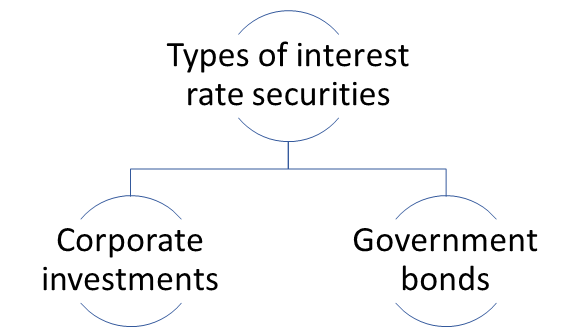What are interest rate securities?
Interest rate security is a financial instrument in which the investor lends money to an institution or company and these institutions pay interest for a specific duration. This is a loan type that is perpetual, that is, the investor can get back the initial investment amount by selling the loan to another institution.
Generally, the time period (maturity) of the majority of interest rate securities is fixed and after the end of the maturity period, the institutions pay the amount back to the investor.
By borrowing money through interest rate securities, the issuer is able to gain access to the long-term debts and it provides them with some certainty which is not provided by short-term borrowings.
In case, the investor does not want to lend till maturity, then they can liquidate the same by selling it to other investors.
Highlights
- Interest rate is a financial instrument in which the investor lends money to an institution or company and these institutions pay interest for a specific duration.
- The time period (maturity) of the majority of interest rate securities is fixed and after the end of the maturity period, the institutions pay the amount back to the investor.
- By borrowing money through interest rate securities, the issuer is able to gain access to the long-term debts and it provides them with some certainty which is not provided by short-term borrowings.
Frequently Asked Questions (FAQs)
What terminologies are associated with interest rate securities?
Cash rate – It is the interest rate that is paid by the financial institutions on the borrowings, or it can be described as the interest rate on overnight lending between banks. The term “cash rate” is largely used in Australia and New Zealand. The rate is determined by the central banks of the countries. The market interest rates are affected by the cash rates.
Bank Bill Swap Rate – In the case of the floating rate products, it is the benchmark for ascertaining the market interest rates. At the bank bill swap rate, the funds are exchanged between the banking institutions. It is more than the cash rate, and the difference between them changes and presents the market moods. When the difference between BBSW and cash rate is low, then it indicates the market confidence and if the difference is huge then it reflects that the market is nervous.
Fixed and floating rates – Investments can have either a fixed rate or a floating rate. Both investments have face value which is paid initially and is paid back to the investor on maturity. In fixed rate, the amount of interest rate remains constant throughout the investment and can be paid on an annual, half-yearly or quarterly basis. However, the interest rate payment in floating rate securities is not constant, but the rate is based on BBSW.
What are the types of interest rate securities?
The interest rate securities include corporate investments and government bonds:
Corporate investments – Corporate bonds are generally traded over OTC. There are mortgage trusts that are offered by the issuing company directly to the investors and a few are also listed on the stock exchanges. The corporate investment includes the unlisted mortgage funds, corporate bonds, floating rate notes, convertible notes and hybrid securities.
Government bonds – They are considered as the safest investment class and they are issued either by State or federal government. Since the security is backed by the government, the repayment of the capital and interest amount is guaranteed. However, the investor can face capital loss in case the asset is sold prior to the maturity of the contract. There is an inverse relationship between the value of bonds and interest rate, that is, with the increase in the interest rate, the price of bonds falls and vice versa also holds true.

What risks are associated with interest rate securities?
There are few risks that should be acknowledged by the investors before investing in interest rate securities. Moreover, the interest rate offered is different for different products.
When lending the money, there is always a risk that the invested amount won’t be repaid after maturity or the interest rate payments will not be made on the due dates. In exchange for taking risks, generally, the investors expect higher returns. Moreover, it adds comfort when the investor knows that the investment can be liquidated easily. Therefore, two factors are crucial while investing in interest rate securities, namely, the creditworthiness of the issuer and the liquidation of the asset.
How to assess the creditworthiness of the issuer?
Credit rating is used to depict the creditworthiness of issuers, for example, A+ is used along with the security. Moody’s and Fitch and Standard & Poor’s are agencies that assign the credit rating to investments. The range of grades is AAA to C, with AAA being the highest grade and C being the lowest. Majority of the rating agencies employs the similar grading letters; the combination of the letter can be different and plus-minus are also used.

Image source: © Dihard909 | Megapixl.com
How to invest in interest rate securities?
It is the feature of unlisted bonds that they have a huge face value, ranging from $50,000 to $500,000 and they cannot be split. Therefore, it becomes difficult to diversify the portfolio properly. If the investor intends to diversify the bond investment just like the share investment, the investor has to include bonds that are issued by separate issuers and have different maturity.
The investment can be done both directly and indirectly. Indirect investment here means that funds are invested through fund managers. These companies provide a range of funds such as the combination of domestic and international bonds, plain vanilla, or leveraged funds to name a few.
On other hand, the investor can choose to directly invest in the government bonds that are offered by state and federal governments. Moreover, the investor can also invest directly in the listed bonds.
 Please wait processing your request...
Please wait processing your request...